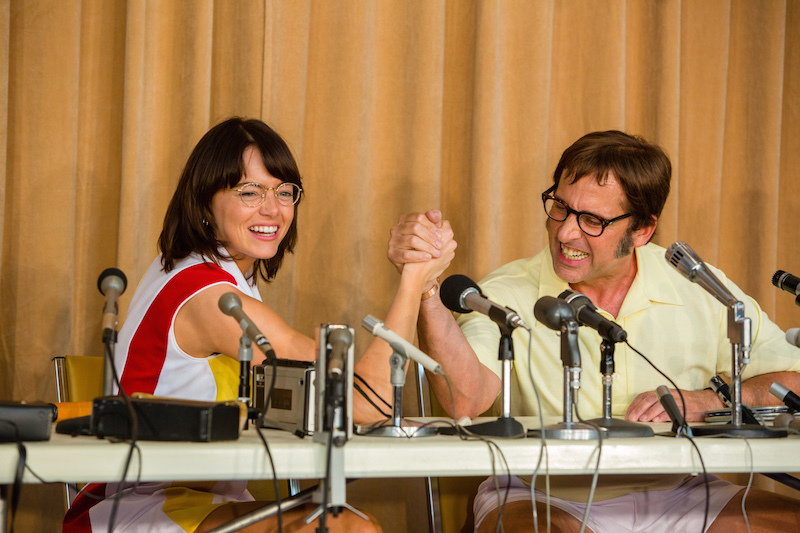
Considering it was such a seismic collision of sports, gender politics, and popular culture, it’s remarkable that the “Battle of the Sexes”—the prime-time televised match between tennis champ Billie Jean King and hustler Bobby Riggs—hadn’t already been turned into a major film. But how fortuitous for us that it hadn’t. For one thing, Emma Stone and Steve Carell give the kind of performances that strongly make the case no one could’ve played their parts better. Also, suffice it to say that the showdown between a trailblazing woman, who nonetheless had to very cautiously construct her public persona, and a gleeful showman who craved attention, has a particular resonance in today’s culture.
It was 1972 and Billie Jean King (Stone), the number one female tennis player in the world, believed that women should be paid the same amount as men on tour. When she confronted Jack Kramer (Bill Pullman), the head of the U.S. Lawn Tennis Association, with this request, he bluntly refused. So, along with her associate Gladys Heldman (Sarah Silverman), she founded the rival Virginia Slims tour. The group of young female tennis players who joined her, including Rosie Casals (Natalie Morales), were a spirited, cheerfully iconoclastic bunch, who stayed in cheap motels on the road and had to do their own promotion—but they knew they were part of something special. Ms. magazine had just been founded and the feminist movement was gaining traction among the younger generation—while rankling those who stood for the status quo.
Enter Riggs (Carell), a 55-year-old player on the senior circuit, who also had a known gambling addiction. When Riggs challenged Billie Jean to a match, he fully leaned into his role as male chauvinist pig—cracking that he loved women “as long as they were in the bedroom and the kitchen.”
But the film suggests this was just a role he was playing. Billie Jean was smart enough to see through him—she even had a grudging fondness for him and his outsized antics. It was Jack Kramer whom she really hated. He wasn’t just a huckster looking to make a buck, but a dyed-in-the-wool sexist.
King would never have even accepted the match with Riggs had Margaret Court, who had briefly snagged the number one spot away from her, lost badly to Riggs in an earlier exhibition. Suddenly, the stakes seemed higher—King had to accept the match to back up her own talk of women’s rights and equal pay.
While all this was going down, King was also going on a journey of personal self-discovery. She had met a free-spirited hairdresser named Marilyn Barnett (Andrea Riseborough) and they were slowly, tentatively falling in love. King was married to a kind man (Austin Stowell), who was devoted to her and unquestioningly accepted a supporting role to her career. But she was a lesbian, who had been living a lie, both to herself and to the world. While women were making slow but steady strides toward equality, the LGBT movement still had a long way to go.
When I first heard that Emma Stone was going to play King, I confess I thought it was bad casting. For one, the freckle-faced, wide-eyed Stone doesn’t look anything like King—and beyond that, there’s an effusiveness to Stone that didn’t seem to fit with King’s more wary and archly knowing demeanor. How wrong I was. First of all, turns out that when she sports King’s signature black shag haircut, shift tennis dresses, and round glasses, Stone manages to bear more than a passing resemblance to the tennis star. She also captures the physical aspects of the role—King’s rounded shoulders, cautious smile, and stiffly abrupt way of raising her arms in victory. More than that, she absolutely nails King’s sly intelligence, fierce competitiveness, and the secret yearnings she forced herself to repress.
As for Carell, he’s a hoot. Part of the joy of the film is how much fun directors Jonathan Dayton and Valerie Faris have with Riggs. In the days leading up to the big match, King trained fiercely. But Riggs went on a ridiculous publicity tour, dressing up as Little Bo Peep on the court and doing comically nude photo spreads for magazines. Carrel does an uncanny impersonation of Riggs—he’s funny and ridiculous and infuriating, but ever-so-slightly endearing.
With its genius cast, wonderfully calibrated emotional and comic beats, and brilliant 70s mimesis, Battle of the Sexes is slick, commercial filmmaking at its best. By the time the big match arrived at the end of the film, my crowd was cheering every Billy Jean King point. It was nice to see the feminist heroine come out on top.
